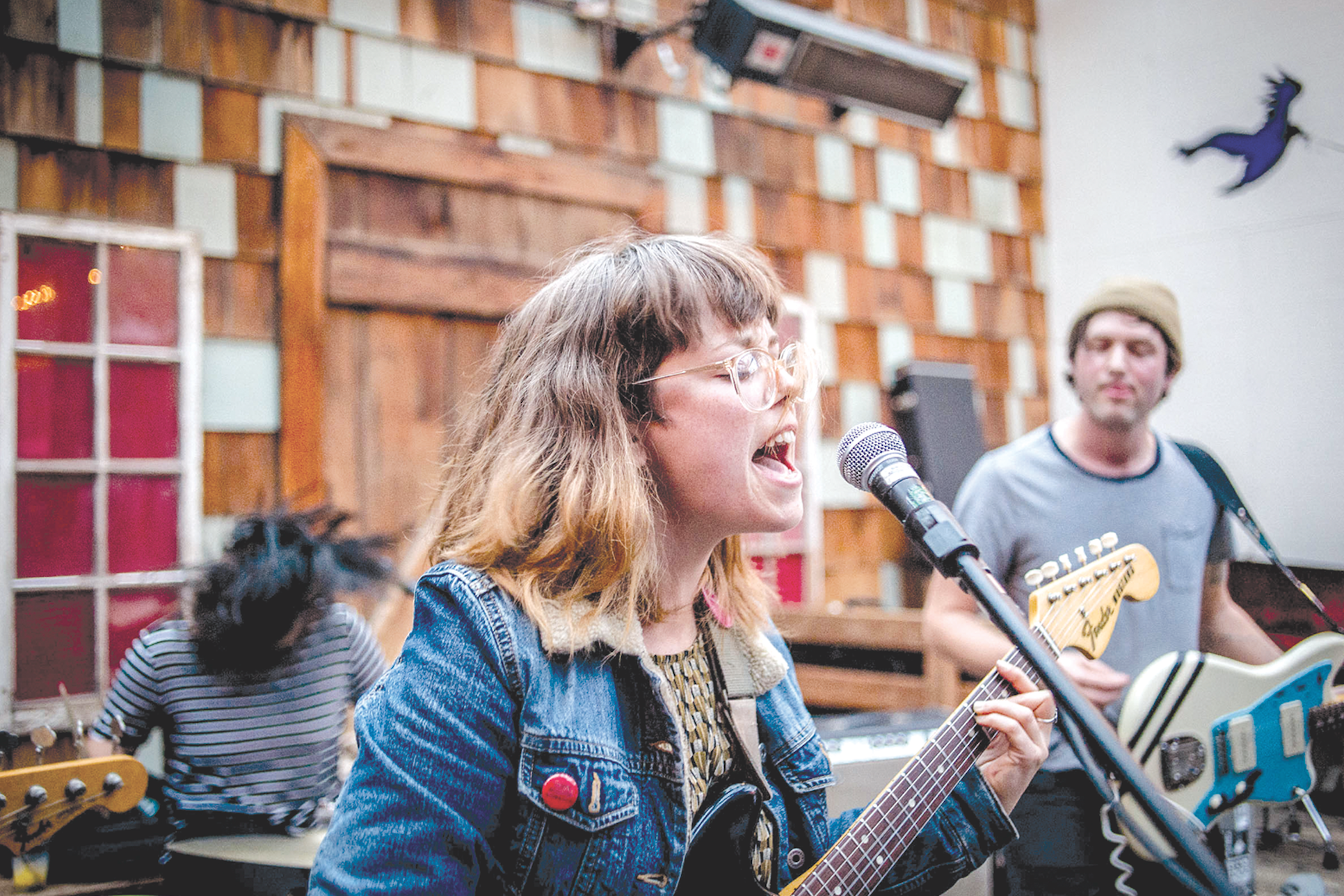Genders


In recent years, Portland has set the bar pretty high. More and more acts gaining national prominence trickle from the city each week, and there seems to be no shortage of genial collaboration and support. Four years ago, one of those new acts was Genders. The quartet released its first full-length, Get Lost, in 2013, and followed up with a massive national tour supporting indie stalwarts Built to Spill. After that, they began on a second studio effort, releasing a few singles throughout 2015 and 2016, culminating in their latest album, Phone Home, out this month.
Sonically, Genders is difficult to nail down. It’s an eclectic collection of influences, sounds and structures. Primarily the brainchild of Stephen Leisy and Maggie May Morris, along with Katherine Paul and Toby Tanabe, the group has put some serious mileage on instruments and automobiles alike.
We caught up with Genders via phone from Boulder, Colo., toward the end of their most recent tour with The Helio Sequence to talk about the rigors of touring, how they put together their new album, and why the Portland scene continues to be one of the stronger music communities in the country.
Eleven: What’s this tour been like for you so far? Do you hate each other [after] being in the van so much yet?
Stephen Leisy: No, it’s a good tour.
Maggie May Morris: This is only two weeks. Our first national tour together was six weeks and that tour we did get in some squabbles, but this tour has been pretty easy. I mean, other than Steve and I both getting wicked head colds, it’s been pretty easy and fun and pretty low stress.
SL: Even for being sick it’s been pretty good. I think the tour Maggie was talking about was the first big tour we did, so maybe that was just learning to work together or something, because I feel everything after that has been a lot easier.
Eleven: You’re road veterans now.
MMM: Two weeks isn’t that long to us. Today we’re like, “Oh my god! We only have four shows! Oh my god! It’s over.” And it feels like we just got into it. I was like, “We’re finally getting over our colds and ready to go.”
Eleven: I was listening to an interview you guys had done years ago, and you were talking about how different it was being able to be more selective with the tracks that you put on to an album, as opposed to just putting everything that you had recorded onto an album. What does your album creation process look like with Phone Home?
MMM: Steve and I do a lot of sending rough demos to each other and that’s the way it’s been working lately … adding stuff to each other’s tracks and working on them.
SL: In the past, we’ve jammed as a band to try and create songs and sometimes some really cool stuff has come from that but…
MMM: That was a lot of what Get Lost was … for some reason it just doesn’t really work that well for us anymore.
Eleven: Do you consider it more like crafting, where you’re taking bits and pieces that you like and putting together individual tracks, or is it one little piece growing to a bigger song?
SL: It feels like it’s probably more fully fledged, fully thought-out songs individually…
MMM: Yeah, more often than not I feel like either Steve or I have fleshed out like the entire structure of a song and at least the basic chord progression. Then Steve will write guitar parts to the songs I demo or vice versa and everyone will write their own part to the song. Usually, the song’s pretty much already there.
The demos for Phone Home are really different than the tracks. “Never Belong To You” is an acoustic bedroom recording that I did, and it just evolved to a heavier, guitar-y vibe. All the songs definitely take a different shape when we all play them together.
Eleven: Since you guys were in bands before Genders and you work on other projects, how does the Portland music scene feels to you? It’s not just the sheer amount of music that Portland cranks out, but you also have the diversity in music and the way that people transition in these different groups. What do you think brings that energy and fullness to Portland, compared to other scenes that maybe aren’t quite as involved?
MMM: I think there’s a lot. I feel like I’m astounded every year. I keep meeting more really sweet, talented people who just really enjoy playing music. I play bass in another band called Deathlist and it’s Jenny Logan’s band and she plays bass for Summer Cannibals. That’s her life; her social life is playing music. We all just have a lot of fun and it’s really inspiring and it keeps it fresh playing different types of music. I have friends that are in country bands and friends that are in ’70s heavy metal style bands. A lot of people don’t limit themselves to what they want to play. It’s very inspiring for sure.
SL: You get to the point where you’re like, “Oh, well, my band’s like a rock band.” But you’re like, “I want to play like in a folk band,” or “I want to play in a goth band or an industrial band.” So many people can just say, “I want to do that … Oh, I’ve got a free night this week, so let’s start working on something.”

Eleven: It seems like a tight knit community. There was that artist, Joel Magid, that put out that social media post about committing a sexual assault and it seemed like the entire community really came together around that.
MMM: I honestly was pretty proud of the music community. A lot of people were just like, “Oh, the music community sucks. This is happening in our community and it’s terrible.” But I really felt like that was one person being a fucking asshole and I saw a lot of my male friends in the community really standing firm, being like, “That person’s not my friend anymore and that’s not OK and I don’t condone that behavior.” [They were] being very, very vocal about shaming that type of behavior and that is something that doesn’t happen a lot in other facets of our society. Brock Turner did three months and we’re just like, “Oh, OK.” But I feel our community is still trying to deal with that and force [Magid] to deal with the repercussions of his behavior.
SL: People came together in a good way. For me, it was shocking because it made me feel naïve … I didn’t think anything like that really could be going on … I was sort of living in a fantasy land where everybody was super progressive and good to each other. But I just think the fact that so many people did rise to the occasion and expressed the same sort of sentiment made us all aware that shit like that can happen in the music scene and we just have to not stand for it and just be really aware.
MMM: It didn’t surprise me. I met that person; he was very egotistical and slimy to me and that doesn’t surprise me. As a woman, I deal with sexist bullshit on a daily basis and that’s the world that women live in and it’s like, “Oh, no, duh?” It’s happening in the music scene because the music scene is a part of the world and that’s just something that women learn to deal with. It’s only when it reaches a certain breaking point that it gets noticed. The daily micro aggressions [are] a constant thing. Where a sound guy calls you “sweetie.” Or says things in a condescending way … it’s just this social conditioning that exists.
What was so shocking about that was all of these women, myself included, were like,”Yeah, I’ve been sexually assaulted.” And all of these dudes are like, “Wait, you were sexually assaulted? Wait, and you, and you, and you, and you?” This is the world we live in. Women are not safe and I think that whole incident … opened up a can of worms. I think it’s really been a positive airing of grievances and forming a support network.
Eleven: I appreciate you guys answering that question. What are your plans for after the album release show on Nov. 5?
SL: We’re going to do another tiny, tiny tour.
Eleven: With Built To Spill?
MMM: Two days with Built To Spill and then two days in California.
SL: Some of that tour got destroyed a little bit by this tour. Some of the shows we’re booking freaked out because we wouldn’t be able to announce the shows until a week or two before and they didn’t like that. But yeah, we’re playing a show in Seattle on Nov. 3.
MMM: Oakland on Nov. 9, Chico on Nov. 10. And then back to Seattle with Built To Spill and then taking a break and working on the next album.
SL: We’ve been writing a lot of songs for the next record … Phone Home was actually something that we worked on a long time ago.
MMM: We’ve actually been playing three songs that aren’t recorded at all, which I think is really good. We usually just write a record, so it’s nice to test [songs] out live a bunch and get a better feel for ideas about how we want to go about recording it. So we’re just going to be demoing a lot in November, December, hopefully recording by February.
SL: Before the beginning of the year, yeah, with The Helio Sequence guys again.»
– Charles Trowbridge




